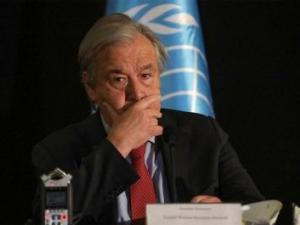
We reflect on our failures as an international community – António Guterres on Genocide against Tutsi
The United Nations (UN) Secretary General, António Guterres has blamed countries that kept quiet until more than one million victims were killed during the 1994 Genocide against Tutsi yet they were aware of the atrocities happening in daylight.
He delivered the message to the global community as Rwanda marks the 28th commemoration of Genocide perpetrated against Tutsi in 1994 highlighting that it is time to stand in aware of the resilience of survivors.
“We stand in awe of the resilience of the survivors. And we reflect on our failures as an international community. The genocide was neither an accident nor unavoidable. It was deliberate, systematic and carried out in broad daylight. No one who followed world affairs or watched the news could deny the sickening violence taking place,” he said.
“Yet too few spoke out and fewer still tried to intervene. Much more could have and should have been done. A generation after the events, the stain of shame endures,” Guterres added.
As Rwanda remembers the bloodshed that occurred 28 years ago, he highlighted, it is a moment for people to recognize that they always have good choices of humanity over hatred ; compassion over cruelty ; courage over complacency ; and reconciliation over rage.
The UN Secretary General also said that the principle of the Responsibility to Protect entails that people can no longer stand idle in the face of atrocity crimes.
Despite endured dark past, Rwanda today stands as a powerful testament of the human spirit’s ability to heal even the deepest wounds and emerge from the darkest depths to rebuild a stronger society.
After having suffered unspeakable gender-based violence, women today hold 60 percent of parliamentary seats.
Among others, Rwanda is the fourth largest contributor to UN peacekeeping operations risking its own soldiers to spare others the pain they themselves have known.
Guterres has further stated that the Genocide against the Tutsi raised questions that affect all humankind, fundamental questions about the role of the Security Council, the effectiveness of peacekeeping, the need to end impunity for international crimes, the need to address the roots of violence, and the fragility of civility.
He stressed that lessons learnt from Genocide against Tutsi should be applied to solve other problems across the world.
“Today of all days, we must recognize the dangers of intolerance, irrationality, and bigotry in every society. As we look back with remorse – let us look ahead with resolve. Let us commit to be ever vigilant and to never forget,” Guterres noted.
He called on the world to pay meaningful tribute to the Rwandans who perished by building a future of dignity, tolerance, and human rights for all.
https://en.igihe.com/news/article/we-reflect-on-our-failures-as-an-inter...
